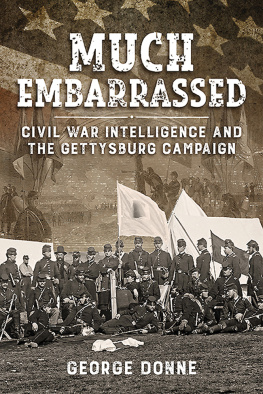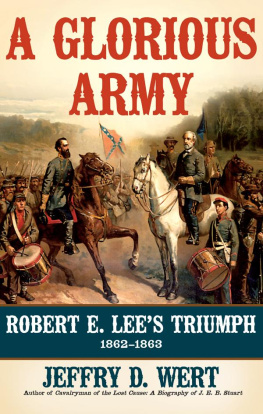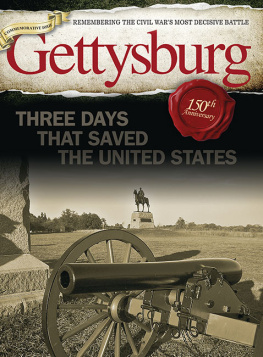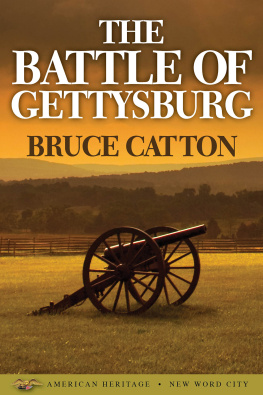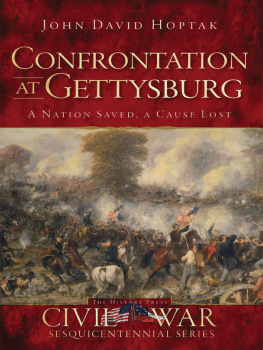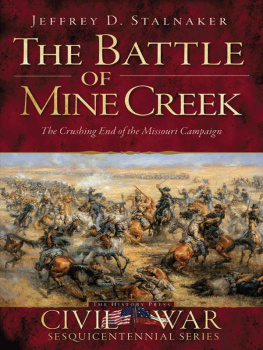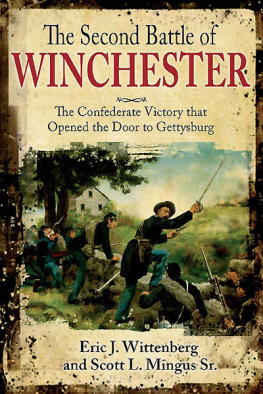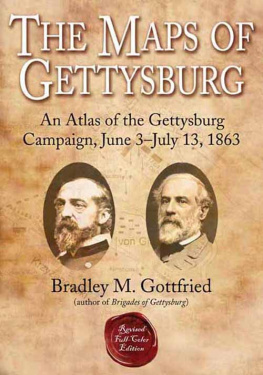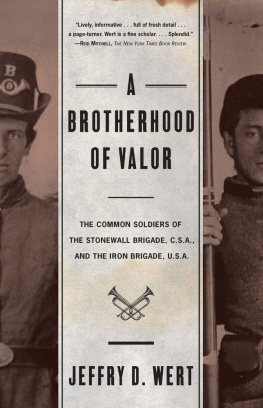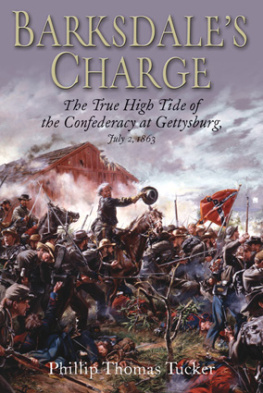
Before the first shots were fired at Gettysburg for many, the most significant engagement of the American Civil War a private battle had been raging for weeks. As the Confederate Army marched into Union territory, the Federal Forces desperately sought to hunt them down before they struck at any of the great cities of the North. Whoever could secure accurate information on their opponent would have a decisive advantage once the fighting started. When the two armies finally met on the morning of 1 July 1863 their understanding of the prevailing situation could not have been more different. While the Rebel Third Corps was expecting to brush away a group of local militia guarding the town, the Federal I Corps was preparing itself for a major battle. For three brutal days, the Rebel Army smashed at the Union troops, without success. The illustrious Confederate General Robert E. Lee would lose a third of his army and the tide of the rebellion would begin its retreat. Robert Lee himself would begin the argument on the contribution of military intelligence to his defeat by seeking to blame his cavalry. Generations of historians would debate what factors played a decisive role, but no one has sought to explore the root of how the most able General of his era could have left himself so vulnerable at the climax of such a vital operation. Much Embarrassed investigates how the Confederate and Union military intelligence systems had been sculpted by the preceding events of the War and how this led to the final outcome of the Gettysburg campaign. While the success of the Confederate strategy nurtured a fundamental flaw in their appreciation of intelligence, recurrent defeat led the Federal Army to develop one of the most advanced intelligence structures in history. Lee was right to highlight the importance of military intelligence to his failure at Gettysburg, but he would never appreciate that the seeds of his defeat had been sown long before.
George Donne was born in Guildford, Surrey and was educated at the Royal Grammar School before completing a Batchelor of Arts in Classics at the University of Durham. Having started work in corporate finance, George became Executive Director of a small, public natural resources company. He is currently a Director of a number of renewable energy and mining ventures, focused on Latin America. A keen amateur historian, George earned a Master of Arts in Military History from the University of Buckingham in 2014. His thesis on the utility of military intelligence during the Gettysburg Campaign was awarded a distinction. Much Embarrassed is his first book. He currently lives in Surrey with his wife, Natalie.
MUCH EMBARRASSED
MUCH EMBARRASSED
Civil War Intelligence and the Gettysburg Campaign
Wolverhampton Military Studies No.23
George Donne
Helion & Company Limited
26 Willow Road
Solihull
West Midlands
B91 1UE
England
Tel. 0121 705 3393
Fax 0121 711 4075
Email:
Website: www.helion.co.uk
Twitter:
Visit our blog http://blog.helion.co.uk/
Published by Helion & Company 2016
Designed and typeset by Mach 3 Solutions Ltd ( www.mach3solutions.co.uk )
Cover designed by Paul Hewitt, Battlefield Design ( www.battlefield-design.co.uk )
Text George Donne 2016
Images open source via author
Maps drawn by George Anderson Helion & Company 2016
Every reasonable effort has been made to trace copyright holders and to obtain their permission for the use of copyright material. The author and publisher apologize for any errors or omissions in this work, and would be grateful if notified of any corrections that should be incorporated in future reprints or editions of this book.
ISBN 978-1-910777-86-2
eISBN 978-1-911096-88-7
Mobi ISBN 978-1-911096-88-7
British Library Cataloguing-in-Publication Data.
A catalogue record for this book is available from the British Library.
All rights reserved. No part of this publication may be reproduced, stored in a retrieval system, or transmitted, in any form, or by any means, electronic, mechanical, photocopying, recording or otherwise, without the express written consent of Helion & Company Limited.
For details of other military history titles published by Helion & Company Limited contact the above address, or visit our website: http://www.helion.co.uk .
We always welcome receiving book proposals from prospective authors.
List of Illustrations
Robert E. Lee, leader of the Confederate Army of Northern Virginia.
General James Longstreet, leader of Lees First Corps and one of his most trusted subordinates.
Federal General George Brinton McClellan.
The dead lie after the battle of Antietam.
Confederate President Jefferson Davis.
Rose ONeill Greenhow, a spy for the Rebellion in Washington.
A party of journalists from the New York Herald Tribune travelling with the army.
Head of the Confederate Signal Bureau, Major William Norris.
Lieutenant-Colonel Arthur James Fremantle, who toured the Eastern Theatre with the Rebels during the Gettysburg campaign.
Robert Chilton, Lees chief-of-staff.
The battle of Malvern Hill, the final engagement of the Seven Days Battle.
General Thomas Stonewall Jackson, the fearsome Confederate leader of the Army of the Shenandoah.
Henry Harrison, Longstreets spy.
Leader of the Federal I Corps, General John Reynolds is shot by a Rebel sharpshooter at the beginning of the battle of Gettysburg.
General James Jeb Stuart, Lees most trusted cavalry officer.
John Singleton Mosby, the Gray Ghost and leader of the Partisan Rangers.
The battle of Fredericksburg, a severe defeat for General Ambrose Burnsides Army of the Potomac.
General Ambrose Burnside.
Federal President Abraham Lincoln.
Edward Porter Alexander, a colleague of Albert Myer and James Longstreets senior artillery officer at the battle of Gettysburg.
The head of the Federal Secret Service, Alan Pinkerton (seated bottom right). Standing behind him is John Babcock.
General Joseph Fighting Joe Hooker, who assumed command of the Army of the Potomac in January 1863.
Daniel Butterfield, Joseph Hookers chief-of-staff.
The men of the B.M.I. George Sharpe is seated far left, next to John Babcock. John McEntee is seated far right.
Thaddeus Lowe, Chief Aeronaut of the US Army Balloon Corps.
The inflation of one of Lowes balloons, the Intrepid .
George Beardslees Magneto-Electric Field Telegraph Machine, smaller and lighter than a Morse machine, but also less powerful.
The godfather of American military signalling, Albert J. Myer.
A detachment of signal officers at the battle of Antietam.
Lee and Stonewall Jacksons midnight meeting before the attack of 1 May 1863.
The battle of Chancellorsville; in the foreground, Stonewall Jackson is fatally wounded.
Commander of the new Third Corps of the Army of Northern Virginia, A.P. Hill.
Richard Old Bald Head Ewell, who assumed command of the Second Corps of the Army of Northern Virginia on Jacksons death.
Benjamin Franklin Stringfellow, one of Jeb Stuarts spies sent to Washington before the Gettysburg campaign.
Alfred Pleasonton, the new commander of the cavalry corps of the Army of the Potomac.
General John Reynolds, the commander of the I Corps and chosen by Hooker to lead the right wing of the Army of the Potomac.
Next page
